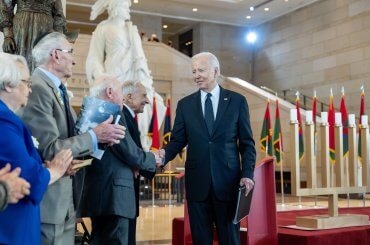Thomas Friedman, the man who is consistently wrong about the Middle East, must have decided to break his long losing streak by simply writing nothing. Friedman, the most influential foreign affairs columnist in the world, has published 19 opinion pieces in the New York Times since June 1 — but only two of them were about the Mideast, the area he lived in for years and where he made his journalistic reputation.
During that 5-month stretch, Friedman has ignored the vigorous debate about Israel’s threat to annex large portions of the occupied Palestinian West Bank, and he has also said nothing about the U.S.-Israeli violent campaign to goad Iran into conflict in the midst of the presidential campaign.
Friedman’s silence must be a calculated strategy to stop tarnishing his reputation even further. His biggest mistake was his enthusiastic endorsement of the U.S. invasion in 2003 (for which, unlike other mainstream pundits, he has never apologized, saying “I would do it again”). More recently, he gushed all over Saudi Arabia’s de facto ruler, Prince Mohammed, as a “reformer” — until the prince ordered the murder and dismemberment of the dissident journalist, Jamal Khashoggi. What’s vital to recognize that what Friedman gets wrong are not just “opinions,” but “facts.”
A couple of decades ago, the New Statesman magazine (the British equivalent of The Nation) published a fascinating article analyzing publications and simple accuracy. The magazine said we should set aside opinions, and look back at how various publications actually interpreted events as they happened. The magazine cited one memorable example: the British-French-Israeli 1956 invasion of Egypt to seize the Suez Canal, after Egypt’s leader, Gamal Abdel Nasser, had nationalized the waterway. The New Statesman found that at the time the mainstream British newspapers had applauded the invasion, endorsing it as a triumph. By contrast, the Statesman had warned that Suez was misguided and would turn into a disaster — which is precisely what happened. The U.S. Eisenhower administration denounced the attack, forcing the invaders to withdraw, and British Prime Minister Anthony Eden had to resign.
The Statesman emphasized that “opinion” is not really at issue here — in 1956 you could have disliked Nasser and thought he shouldn’t have nationalized the canal, but still recognized the reality that the British-French-Israeli attack would turn out badly, even for the invaders.
Back to today. There’s clear evidence that the U.S. and Israel are trying to provoke Iran into conflict, which could turn into a disaster that would dwarf the 2003 U.S. invasion of Iraq. Friedman’s own paper has failed to fully report on this sabotage campaign, but it has at least covered it obliquely. Friedman’s colleagues on the Times editorial board have recognized that Trump’s latest sanctions on Iran are “collective punishment for tens of millions of innocent Iranians.” If Iran can be provoked into retaliating, America could be paying the consequences 20 years from now, just as the 2003 Iraq catastrophe spurred the rise of ISIS and other tragedies.
Thomas Friedman continues to squat on one of the most valuable pieces of journalistic real estate on the planet. And he continues to say nothing.



“Friedman, the most influential foreign affairs columnist in the world, …”
Any support for that grandiose claim?
Friedman seems to be putting the collective interest of Israeli state ahead of his own personal advancement in his career.
James North is usually an insightful commentator on the New York Times, but this article is disappointing. The headline says that Friedman “won’t write about the Middle East”, but then the lead paragraph says that two (not zero) of Friedman’s last 19 published opinion pieces were about the Mideast. What were those two pieces about? I was hoping to learn that in this article, but it doesn’t say. And why focus on Friedman’s last 19 pieces only? June 1 is not a natural separating date, and this article doesn’t say why that date was chosen, or how much Friedman wrote about the Middle East in the immediately preceding months. And then we have the digression about a New Statesman article, that doesn’t really connect back to Friedman, because a historical example of mainstream publications applauding a government action is not a parallel to the current example of a columnist’s silence. Furthermore, if the New Statesman article from “A couple of decades ago” is indeed “fascinating”, then why is there no date, title, or link? The reader is left with the impression that the author remembers having read the article, but couldn’t find it.
So we have an article calling a journalist a coward for choosing what to write on. Will Mondoweiss cover the beheading of a geography teacher by a screaming Muslim fanatic in…Paris? Because the teacher spoke about cartoons? Let me guess. There will be a flurry of whataboutism but because of North’s intellectual cowardice no article. The president of France addressed the subject. But not Mondo.
Tom Friedman probably thinks that nobody cares about the Middle East now, and he’s probably right about that.
As loathe as Mondoweiss is to admit it, the Covid pandemic, the near collapse of the global economy, and the 2020 elections, trumps Israel and the Palestinians.
I hate being the bearer of bad news, but this will be the case well into next year.